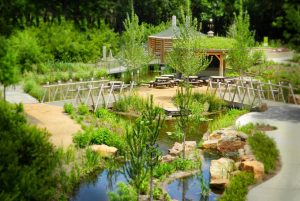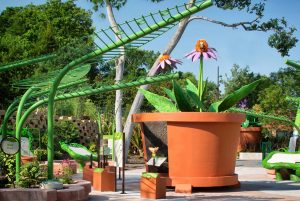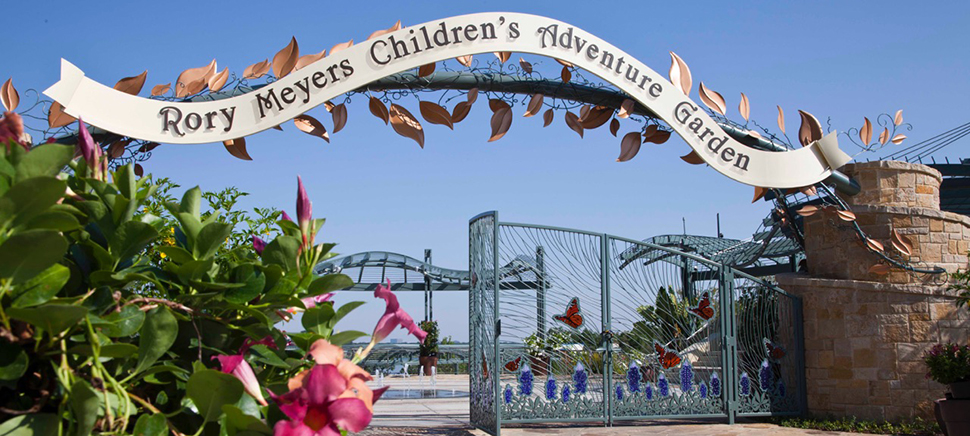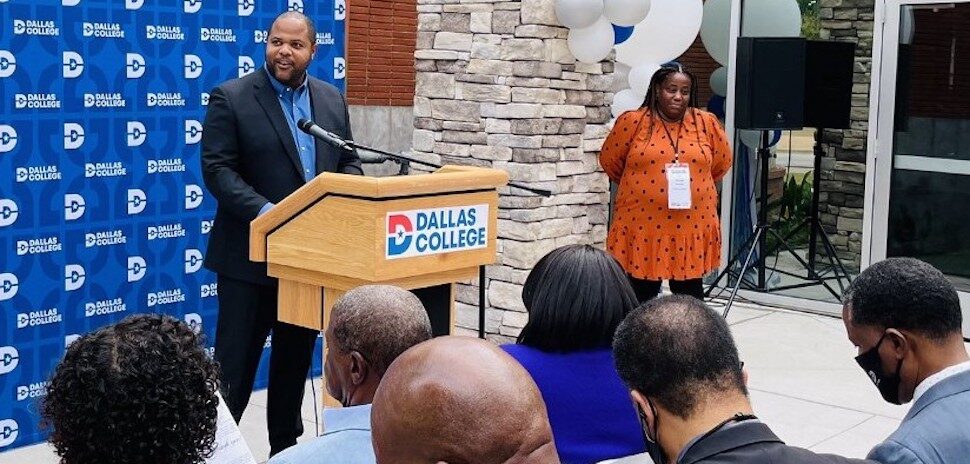DALLAS ARBORETUM FOCUSES ON HANDS-ON LEARNING
The Texas Parks and Wildlife Department recently certified the Rory Meyers Children’s Adventure Garden as a Texas Aquatic Science Field Site for the garden’s Texas Native Wetlands feature.
The 8-acre garden, which opened at the Dallas Arboretum and Botanical Garden in 2013, serves 120,000 children in and around the Dallas area each year. The Texas Aquatic Science curriculum will incorporate the garden’s existing programming.

The wetlands area at the Dallas Arboretum.
The garden’s wetlands feature is a half-acre of space that consists of a real wetland water system filled with native Texas plants. Wetlands naturally clean water and control flooding. They also provide habitats for a wide array of animals and act as an example of a diverse ecosystem.
In the garden, children have the opportunity to walk along the boardwalks looking for fish or to view footage of what’s going on under the water. They can perform water sampling and analyze their findings as well as learn firsthand about the effects of pollution on life systems. They can also walk along trails or hide in a blind to watch for animals and migrating birds.
PLANS FOR CHILDREN’S GARDEN TAKE ROOT
A few years ago, the Dallas Arboretum decided to build a space kids could call their own. This children’s garden wouldn’t just be fun and games. Through it, the Dallas Arboretum hoped to teach the kids something, too.
Staff members traveled for four years to gather information and concepts from aquariums and science centers around the world. The idea was to organize the garden into learning areas to make an outdoor classroom, or a museum without walls, as Dallas Arboretum President and CEO Mary Brinegar calls it.
“We wanted everything in our garden to be in line with state and national curriculum for children in kindergarten through sixth grade, in the areas of life and earth science,” she said. “We’re located on White Rock Lake — we didn’t need another playground. We needed a place where children could come into the botanic gardens and learn the principles of nature that they need to know in school.”
The more than $60 million Rory Meyers Children’s Adventure Garden, which offers 150 indoor and outdoor interactive activities, opened its doors in September 2013.
Recently, it won an Award for Outstanding Achievement from the Themed Entertainment Association.
INTERACTIVE EXHIBITS BRING LEARNING TO LIFE
Each area of the garden uses outdoor exhibits that educate children in specific areas. The exhibit, “Plants Are Alive,” features oversized models of flowers and plants with LED lights that demonstrate their internal processes — which, in a normal-sized plant, would otherwise be too small for a child to see and understand. These models help young children grasp that plants are alive and that their body parts — just like human or animal body parts — all work together to sustain the plant’s life.

The Plants Are Alive Gallery
There’s an interactive energy “island” that shows kids how solar, wind, and water power work. There’s a sprawling hedge that teaches children about directions and critical thinking, an “incredible edible garden” devoted to the principles of good health and plant-based food, a skywalk where visitors can listen for animals, and a hands-on geologic timeline.
There are 125 touch-screen computers with a rotation of different learning games. There’s also the OmniGlobe, a sphere that allows children to witness the changes in our world over huge spans of time. The garden even offers continuing professional education credit.
Brinegar said people come from all over the world to visit the Rory Meyers garden — to experience it, and to learn its lessons.
“Evaluations done by SMU are able to show an increase in retained learning, not only by school groups, but also in families,” Brinegar said. “Children have greater retained knowledge than they do in a classroom. If you want to make kids learn, you’ve got to make it the kind of thing they learn and then want to come back to show someone else. You’ve got to make it fun.”
For a daily dose of what’s new and next in Dallas-Fort Worth innovation, subscribe to our Dallas Innovates e-newsletter.




























